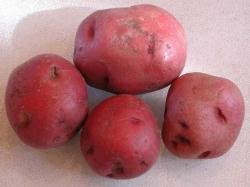In this article, we delve into the fascinating world of potato genetics and explore how advancements in this field are revolutionizing potato farming. Using the latest data and insights, we highlight the significant impact of genetic research on crop improvement, disease resistance, and yield enhancement. Join us on this journey to discover how genetics is empowering farmers to cultivate superior potato varieties.
Potatoes have long been a staple crop, providing sustenance and economic opportunities for farmers worldwide. However, the pursuit of better and more resilient potato varieties has always been a challenge. Fortunately, genetic research and advancements are opening new doors for the agricultural community, enabling farmers to access enhanced potato varieties that offer improved yield, disease resistance, and adaptability to various environmental conditions. According to the latest data from Selekcija.ru, the field of potato genetics is transforming the potato industry, heralding a new era of agricultural possibilities.
Genetic research plays a pivotal role in developing superior potato varieties. By identifying and manipulating genes responsible for desirable traits, scientists can selectively breed potatoes that exhibit enhanced characteristics, such as increased yield, disease resistance, improved storability, and superior nutritional content. Through conventional breeding methods, as well as modern techniques like genetic engineering and marker-assisted selection, researchers are accelerating the development of innovative potato cultivars that meet the evolving demands of farmers and consumers alike.
The impact of genetics on potato farming cannot be overstated. A study published by the International Potato Center (CIP) reveals that the adoption of improved potato varieties, developed through genetic research, has led to significant yield increases and enhanced productivity in various regions. In addition, these genetically improved varieties have demonstrated heightened resistance to pests and diseases, reducing the need for chemical interventions and promoting sustainable farming practices.
Furthermore, the potential for genetic modification holds promise in addressing specific challenges faced by potato farmers. For instance, researchers are actively working on developing genetically modified potatoes with enhanced resistance to late blight, a devastating disease that can cause significant yield losses. These genetically modified varieties have the potential to reduce reliance on chemical fungicides and alleviate the economic burden on farmers while ensuring a more secure and sustainable potato supply.
In conclusion, the field of potato genetics is reshaping the future of potato farming. Through the application of genetic research, farmers are gaining access to improved potato varieties that exhibit higher yields, increased disease resistance, and enhanced nutritional value. The continuous advancements in this field hold immense potential to address pressing agricultural challenges, promote sustainability, and provide farmers with the tools to thrive in a changing agricultural landscape.
Tags: Agriculture, Potato Genetics, Crop Improvement, Disease Resistance, Genetic Research, Sustainable Farming, Genetically Modified Organisms (GMOs), Crop Yield, Environmental Sustainability







